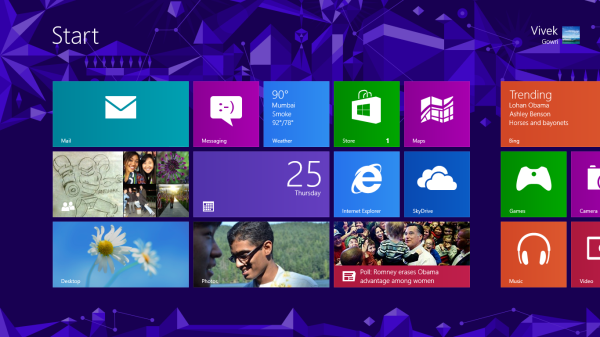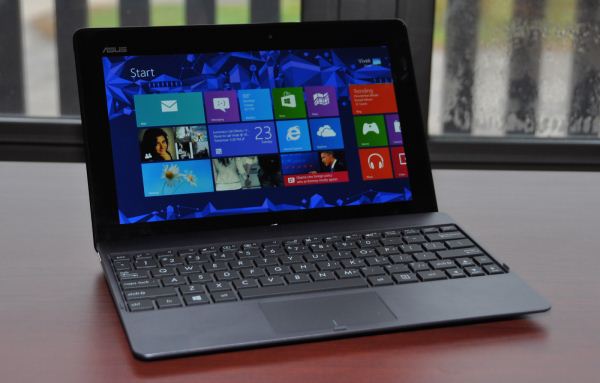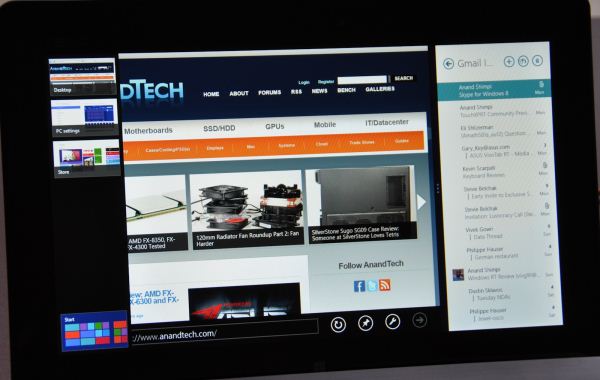The Windows RT Review
by Vivek Gowri & Anand Lal Shimpi on October 25, 2012 12:00 PM EST- Posted in
- Windows RT
- Operating Systems
- Microsoft
- Mobile
- Windows 8
- Tablets
Final Words
So, ten thousand words later, what can we take away from Windows RT? It’s definitely another superb user experience design from Microsoft. Say what you will about Windows Phone 7, but damn if that UI isn’t gorgeous. The Metro design language translates over to the tablet form factor really well, resulting in the Windows Modern UI. We’ve obviously known how Modern UI looks and feels through the various Windows 8 preview builds, but Windows RT ends up being more focused and offering a more consistent experience. It’s a side effect of being limited to apps from the Windows Store - because you spend a significant majority of your time in the new Windows UI, desktop use is minimized. In Windows RT, the Windows Desktop serves the purpose of being the more capable and powerful layer underneath the main portion of the UI, as opposed to Windows 8, which sometimes feels like the new Windows UI existing as an impractical interface layer on top of the traditional desktop.
The dichotomy just feels more comfortable in Windows RT than I feel like it has been in the previous Windows 8 systems that I’ve dealt with. It’s nice. This is the first time I feel like I’ve really connected with the new Windows UI, it makes a ton of sense to me now. I still think for mouse-based navigation, you’re better off treating it as a glorified Start menu, but it’ll be interesting to see how legacy programs affect the use of Modern UI in x86-based Windows 8 tablets as the Windows Store matures.
If you’re really concerned about the state of third-party apps, you just have to wait and see. I’ve seen a lot of snap judgements made about Windows RT in the last couple of days based on the dearth of good applications in Windows Store, and while I agree with that sentiment, I feel like it’s extremely shortsighted to write off the ecosystem already. Neither version of the OS has gone on sale yet, and we know that there are a number of applications that will go live on the official release date, as well as many more coming in the weeks ahead.
This isn’t like Windows Phone, where we need to see whether the platform will get any market traction before predicting the growth of the app marketplace. You can basically assume that the marketplace will expand significantly unless somehow everyone stops buying Windows-based systems on October 26th. The odds of that situation arising seem relatively low, so my bet is that the strength of the ecosystem will be a non-issue a month from now.
The default inclusion of Office 2013 and the emphasis on physical keyboards makes Windows RT the first tablet platform to significantly address the question of productivity. Combined with the equally advanced task switching and multitasking built into the UI, and this becomes the first legitimately useful tablet operating system out there. The Galaxy Note 10.1 wasn’t bad, but it was a single device that built additional functionality into a custom Android skin. Every single Windows RT slate comes out of the box with Office and the ability to have multiple active application windows. It’s just a few steps ahead of competing tablet platforms at this point.
And it’s not like RT loses out on a content consumption front. It’s paired with what is a very strong entertainment store and gaming franchise in Xbox Live, and the browsing experience is definitely competitive. It’s also a competent e-reader, with Amazon’s Kindle being one of the headlining apps currently in Windows Store. It even matches the power efficiency of the other ARM-based tablets, with competitive battery life and standby time. Obviously, ARM is the driving factor in the low power consumption, but it’s good to see that Windows is on a similar level as iOS and Android.
So this is a tablet platform that can do a good job of replacing both an iPad and an ultraportable in a number of different workflows. You get the best of both worlds, in some sense - Windows RT tablets have similar form factors to the iPad and leading Android tablets, and offer near-equal battery life, performance, and user experience, but they also give you the added benefit of strong productivity applications and the power of Windows Desktop. From a conceptual standpoint, almost anything you can do with an iPad can be done equally well (or close) on a Windows RT tablet, but the desktop-caliber office suite and versatile multitasking interface of Windows RT are impossible experiences to replicate on the iPad. It's not a perfect operating system by any means, but it brings a new dimension to the tablet space. So if you’re looking for a new tablet this fall, Windows RT deserves your consideration.













233 Comments
View All Comments
Dorek - Friday, November 2, 2012 - link
AFAIK, task manager tray doesn't even have thumbnails. Come on, it's not comparable to what Windows 8 and Windows RT do. Have you used them?yyrkoon - Sunday, October 28, 2012 - link
The software issue, will not be much of an issue at all.Microsoft will just write another abstraction layer ( HAL ) for ARM. Which is most likely what they've done here.
Passed that. IF any abstraction layers need to be written for the COM model, or .NET libraries. You can rest assured Microsoft will cover that as well. If it hasnt been covered already. Which Im betting it has.
Again, this is nothing like WinCE.This is a real OS, for real end users, with a different HAL.
The biggest issue as I've stated in previous posts. Is not whether it will be easy to write applications for Windows RT. But whether software developers deem it prudent to spend thousands of dollars on Microsoft development tools( not absolutely necessary ). THEN pay Microsoft a forced 30% distribution fee. Through their app store.
For me personally. The 30% fee alone is enough for me to jump ship. And I really enjoy writing apps for Windows. We'll see how it all works out in the end.
karocage - Friday, October 26, 2012 - link
This comment from the article seemed odd to me:"This isn’t like Windows Phone, where we need to see whether the platform will get any market traction before predicting the growth of the app marketplace."
Market traction and app store growth don't seem to have much if any relationship with Windows Phone. WP7 hit 100,000 apps faster than either iOS or Android and has over 125,000 now. If anything, that would seem to indicate that MS really does have a lot of pull with developers independently of market share. So while I agree that the sheer number of devices will be a big draw, I'd argue that's just the cherry on top that guarantees we're going to see a ton of support really quickly for RT/Metro apps.
Obviously buying a WinRT tablet today will be pretty limiting in terms of 3rd party software, but experience from WP7 suggests this will be a very short-lived downside of the platform.
Dorek - Friday, November 2, 2012 - link
Good point. I've been on Windows Phone 7.5 for a year, and have never had the problem of not being able to find an app I want. (With the exception of Pandora, the assholes. Can't even use third-party ones because they block them. But I have a Zune--I mean, Xbox Music Pass anyway. So screw Pandora.)andypost - Friday, October 26, 2012 - link
Anandtech writes the best articles. period.Thanks to Vivek Gowri and Anand Lal Shimpi for a great article.
Visual - Friday, October 26, 2012 - link
You say it is impossible to make desktop apps, but...I read that Win RT still has PowerShell. A lot of PowerShell scripts on x86 just invoke various functions in third-party ActiveX controls, which are just x86 executable binary libraries, and that will not work on RT... but maybe at least the core MS objects still work? For example, if Windows Forms or Windows Presentation Foundation still works, then PowerShell scripts can create desktop windows with various GUI elements.
And since there is an IE, maybe HTA applications work as well?
Do you have some scripting geek working at AT that could test these theories out?
On another topic, I am very surprised you say there are x86 executables on your install. That is just wasted space on a device that doesn't get a large drive to begin with anyway. MS would get in serious trouble if it were true... Are you sure?
And lastly, I am curious if a Win RT device is supposed to be able to get plugged to a "real" Windows computer over USB for charging or for as a mass storage drive, for transfering files... If it is, then coudn't you also plug one RT device to another RT device? Then which one will become the "host", and which one will become the peripheral?
Dorek - Friday, November 2, 2012 - link
"And lastly, I am curious if a Win RT device is supposed to be able to get plugged to a "real" Windows computer over USB for charging or for as a mass storage drive, for transfering files... If it is, then coudn't you also plug one RT device to another RT device? Then which one will become the "host", and which one will become the peripheral?"Dude...that's deep.
(That's actually a really good question. Surface can't be charged over USB, but I don't know about other ARM devices.)
tommo123 - Friday, October 26, 2012 - link
i mean if someone writes an app and gives it away. there's no sideloading so if has to go through the store right?will microsoft host it for free? if not then they're effectively killing off free software for windows are they not? at least win rt which is eventually (how they'd like) desktop windows to go too.
tipoo - Friday, October 26, 2012 - link
Yes they'll host it for free. And there are many free apps already, there was a influx of apps on launch day and most reviews were done before that. They only take a percentage of the cuts from paid apps, nothing from free.Visual - Friday, October 26, 2012 - link
I forgot one question in my previous post.How is the browser performance with many many tabs open at once? Like 20, or even 100?
I sometimes use tabs in a bit weird way, ctrl+clicking possibly interesting links in some large index page to open them in a background tab for later reviewing it in more detail. Even without Flash, with IE9 starting a new process for each tab by default and a few animated gif ads and various JS scripts on each tab, it really kills Atom Netbooks and even CULV Core 2. It's probably more of a memory usage thing than a CPU thing actually... But anyway, how could that go on these new ARM devices?